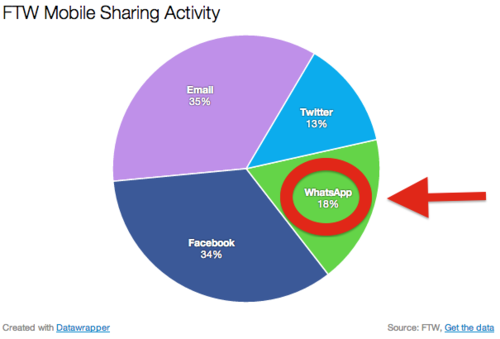Traffic origination is shifting to messaging. Once upon a time, traffic to websites originated from search. And Google put a toll on it by selling sponsored results. Now Google is worth >$350B. Then, social media went from driving 5% of traffic to >25% and probably a bunch more. Now Facebook and Twitter are worth >$150B and ~$20B. Now this….
According to Digiday, 18% of sharing activity on FTW (USA Today’s viral sports site) comes from the WhatsApp share button. (Same post notes similar WhatsApp sharing craziness on Buzzfeed, Shazam, and Aviary). This is a really big deal and may finally explain why Facebook laid out $19B for WhatsApp and why Evan Spiegel negged Facebook’s $3B Snapchat indication of interest.
Point is, when applications:
(1) have tons of users (duh), and
(2) originate traffic to publishers, other apps, and the like (ok); they
(3) can make lots of money (how?)
Here we go again….
Google once had tons of traffic and had no revenue. The fledgling search company was all but laughed at for not doing banner advertising (see here) and everyone cried when it ‘destroyed the integrity of search’ by allowing companies to pay to sponsor search. People may not remember, but it happened.
Facebook and Twitter once had tons of traffic and minimal revenue. Facebook did a little (>$4B?) of display, but now generates most of its revenue from mobile / sponsored feed posts. And Twitter makes its money similarly. Everyone cried when both ‘destroyed the integrity of the feed’ by cluttering it with ads (and some are still crying), but by and large nobody cares, the ads work (uh huh), and the companies are making money (yuh huh). See here, here, and here re-sponsored posts, Facebook’s business model, and paying for downloads (i.e., app traffic).
So, um, messaging?
The early complaint re Google and ad revenue was that people used Google to go elsewhere (i.e., users didn’t stay at Google like they did with Yahoo and other portals – they searched and bounced elsewhere). And the complaints re Facebook and Twitter are that people don’t use them with purchase intent like they do Google. (I’ll throw out that people once didn’t use Google with purchase and intent, but whatever.)
Similarly but differently, naysayers re messaging note that messaging is private and peer-to-peer (i.e., not as viral) and therefore ads won’t work. First, USA Today/FTW’s robust sharing traffic from WhatsApp would suggest otherwise re the latter. And re ‘ads’ we need to think about what that unit will be. With Google it wasn’t display and in social it wasn’t paid search. So to look at messaging and expect an exact replica of an existing ad unit would be naive. Will it be stickers or sponsored apps or some sort of paid functionality or something entirely different, I don’t really know. But considering the enormous and growing user bases and even more enormously and faster growing activity via messaging, it seems clear that the revenue potential is real (again).




